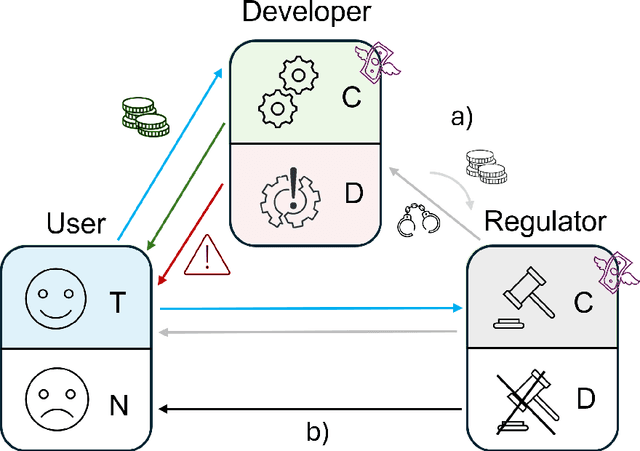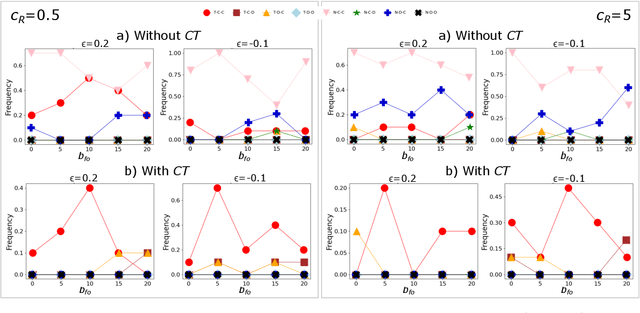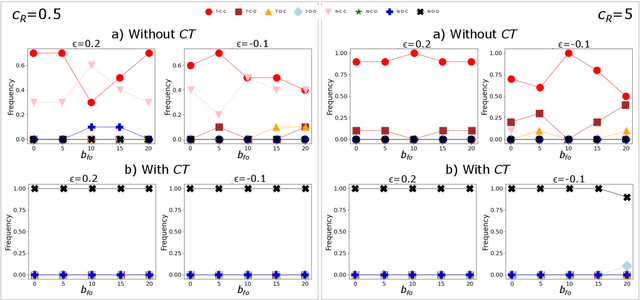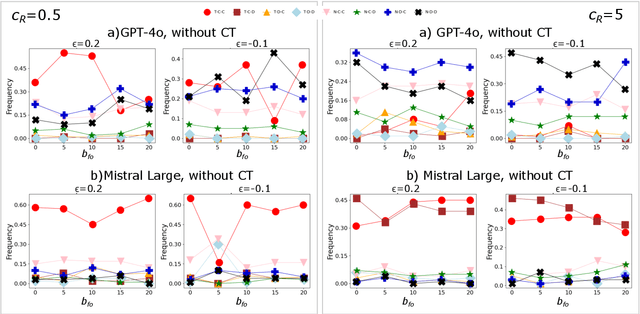Marcus Krellner
Do LLMs trust AI regulation? Emerging behaviour of game-theoretic LLM agents
Apr 11, 2025



Abstract:There is general agreement that fostering trust and cooperation within the AI development ecosystem is essential to promote the adoption of trustworthy AI systems. By embedding Large Language Model (LLM) agents within an evolutionary game-theoretic framework, this paper investigates the complex interplay between AI developers, regulators and users, modelling their strategic choices under different regulatory scenarios. Evolutionary game theory (EGT) is used to quantitatively model the dilemmas faced by each actor, and LLMs provide additional degrees of complexity and nuances and enable repeated games and incorporation of personality traits. Our research identifies emerging behaviours of strategic AI agents, which tend to adopt more "pessimistic" (not trusting and defective) stances than pure game-theoretic agents. We observe that, in case of full trust by users, incentives are effective to promote effective regulation; however, conditional trust may deteriorate the "social pact". Establishing a virtuous feedback between users' trust and regulators' reputation thus appears to be key to nudge developers towards creating safe AI. However, the level at which this trust emerges may depend on the specific LLM used for testing. Our results thus provide guidance for AI regulation systems, and help predict the outcome of strategic LLM agents, should they be used to aid regulation itself.
Media and responsible AI governance: a game-theoretic and LLM analysis
Mar 12, 2025Abstract:This paper investigates the complex interplay between AI developers, regulators, users, and the media in fostering trustworthy AI systems. Using evolutionary game theory and large language models (LLMs), we model the strategic interactions among these actors under different regulatory regimes. The research explores two key mechanisms for achieving responsible governance, safe AI development and adoption of safe AI: incentivising effective regulation through media reporting, and conditioning user trust on commentariats' recommendation. The findings highlight the crucial role of the media in providing information to users, potentially acting as a form of "soft" regulation by investigating developers or regulators, as a substitute to institutional AI regulation (which is still absent in many regions). Both game-theoretic analysis and LLM-based simulations reveal conditions under which effective regulation and trustworthy AI development emerge, emphasising the importance of considering the influence of different regulatory regimes from an evolutionary game-theoretic perspective. The study concludes that effective governance requires managing incentives and costs for high quality commentaries.
Trust AI Regulation? Discerning users are vital to build trust and effective AI regulation
Mar 14, 2024Abstract:There is general agreement that some form of regulation is necessary both for AI creators to be incentivised to develop trustworthy systems, and for users to actually trust those systems. But there is much debate about what form these regulations should take and how they should be implemented. Most work in this area has been qualitative, and has not been able to make formal predictions. Here, we propose that evolutionary game theory can be used to quantitatively model the dilemmas faced by users, AI creators, and regulators, and provide insights into the possible effects of different regulatory regimes. We show that creating trustworthy AI and user trust requires regulators to be incentivised to regulate effectively. We demonstrate the effectiveness of two mechanisms that can achieve this. The first is where governments can recognise and reward regulators that do a good job. In that case, if the AI system is not too risky for users then some level of trustworthy development and user trust evolves. We then consider an alternative solution, where users can condition their trust decision on the effectiveness of the regulators. This leads to effective regulation, and consequently the development of trustworthy AI and user trust, provided that the cost of implementing regulations is not too high. Our findings highlight the importance of considering the effect of different regulatory regimes from an evolutionary game theoretic perspective.
Words are not Wind -- How Joint Commitment and Reputation Solve Social Dilemmas, without Repeated Interactions or Enforcement by Third Parties
Jul 13, 2023Abstract:Joint commitment was argued to "make our social world" (Gilbert, 2014) and to separate us from other primates. 'Joint' entails that neither of us promises anything, unless the other promises as well. When we need to coordinate for the best mutual outcome, any commitment is beneficial. However, when we are tempted to free-ride (i.e. in social dilemmas), commitment serves no obvious purpose. We show that a reputation system, which judges action in social dilemmas only after joint commitment, can prevent free-riding. Keeping commitments builds trust. We can selectively enter joint commitments with trustworthy individuals to ensure their cooperation (since they will now be judged). We simply do not commit to cooperate with those we do not trust, and hence can freely defect without losing the trust of others. This principle might be the reason for pointedly public joint commitments, such as marriage. It is especially relevant to our evolutionary past, in which no mechanisms existed to enforce commitments reliably and impartially (e.g. via a powerful and accountable government). Much research from anthropology, philosophy and psychology made the assumption that past collaborations were mutually beneficial and had little possibilities to free-ride, for which there is little support. Our evolutionary game theory approach proves that this assumption is not necessary, because free-riding could have been dealt with joint commitments and reputation.
 Add to Chrome
Add to Chrome Add to Firefox
Add to Firefox Add to Edge
Add to Edge